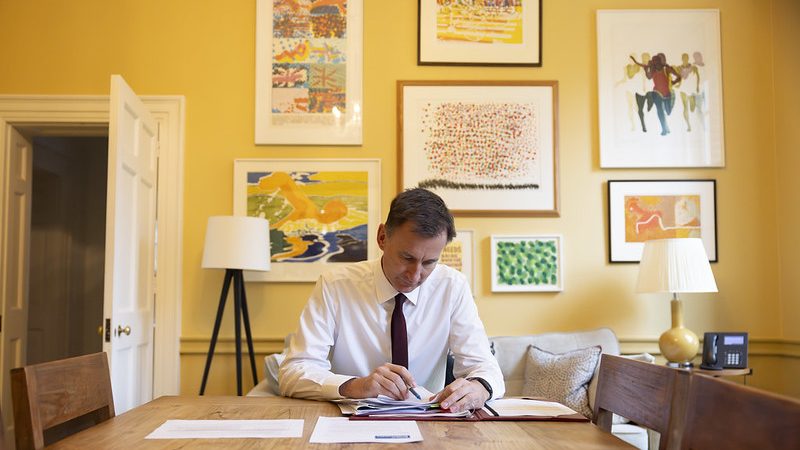
In any fiscal event, there is a conflict between economics and politics. Today in the autumn statement, the Chancellor showed his colours, selecting narrow political appeal to the Tory base over the stable economics he has championed since being instated.
It is worth remembering, in the midst of these tax cuts, that it is only just over a year ago that Liz Truss and Kwasi Kwarteng caused market chaos by offering unfunded tax cuts. Yet here we are again.
The Chancellor states that he is spending ‘fiscal headroom.’ Let’s be clear – that is not real money. Rather, the dire state of the public finances has exceeded the Treasury’s very low fiscal expectations. Hunt has been able to maintain the fantasy of debt falling as a percentage of GDP by the end of his forecast horizon – his fiscal rule – but only by pledging completely unrealistic spending freezes during the next parliament.
Hunt has promised jam today and will be asking Labour to foot the bill.
The medium-term fiscal situation is dreadful. Existing commitments, such as the NHS workforce plan, require an influx of spending over the next parliament. Taxes are at a record high, but pressure on public services is at breaking point.
Growth, meanwhile, is projected to be anaemic at best. A responsible government would look to increase revenue going forward. Instead, the Chancellor has cut National Insurance in a crude but expensive way.
Have no doubt – this is not a tax-cutting government. The freezing of tax thresholds – so-called ‘fiscal drag’ – has caused an effective tax hike of over £50 Bn. Far from cutting taxes overall, today has seen the Government completing a transfer in the tax burden, giving with one hand whilst they take much more with the other. The Government literally raised National Insurance, the same tax, earlier on in this Parliament.
When it comes to spending, increasing Universal Credit in line with inflation is welcome, but the commitment to uprating the state pension by 8.5% yet again shows a gross emphasis on handouts for Conservative voters at the expense of the neediest in our society. His other spending measures are trivial – tweaking an economy that has fundamental issues with productivity and growth.
In 1997, Gordon Brown took over the Treasury with the public finances, and indeed the economy, in a reasonable condition. The Conservatives, despite the chaos of Black Wednesday, gave a good economic inheritance to New Labour.
If we can finally remove the Conservatives from Downing Street in the next 12 months – by no means a foregone conclusion – Labour’s inheritance will be much, much worse. Sunak’s Conservatives are acting like wedding guests with an open bar. A bill for today’s antics will come due, but they are hoping they won’t be around when it does.
The pressure on Rachel Reeves and the rest of the Shadow Treasury team, therefore, is mounting even higher. Where the government faces tension between politics and economics, for the Shadow Chancellor they are in alignment. Every penny must be accounted for.
It can be no coincidence that Hunt’s political antics today come following weeks of speculation that he might be replaced by a ‘more political Chancellor.’ He has shown that, far from the steady hand who replaced Kwarteng, he can be relied upon to prioritise Conservative election chances over his economic legacy. Hunt cuts a feeble figure, contrasted with Reeves. Her image as the new ‘Iron Chancellor’ stands in distinction to his ‘tin-pot tinkerer.’
But economic credibility is much more easily shattered than it is built. As the Conservatives sacrifice economic credibility in favour of their base, now more than ever we must not follow suit. We shouldn’t fall for this. For all the talk of ‘long-term decisions’, the Conservatives have abandoned even the pretence of economic prudence.




More from LabourList
‘AI regulation is key to Labour’s climate credibility’
Ben Cooper column: ‘Labour needs to rediscover its own authentic populism’
‘Westminster rethought: a new purpose built site and a museum of democracy’